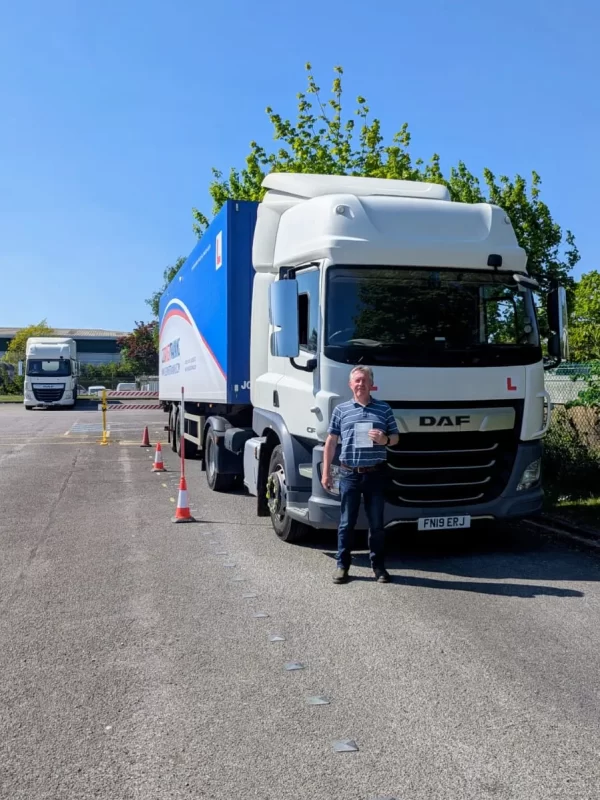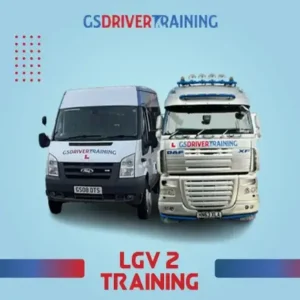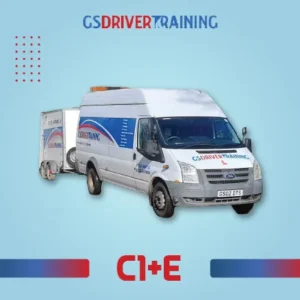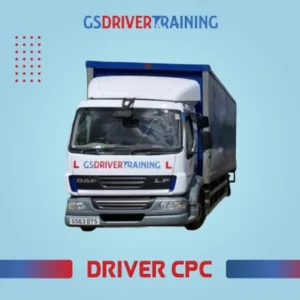HGV Training Coventry
If you’re looking for HGV (Heavy Goods Vehicle) training in Coventry, England, you have several options to consider. Here are some steps to help you find HGV training in Coventry:
Search Online:Start by doing an online search using keywords like “HGV training Coventry” or “LGV training Coventry.” This will provide you with a list of training providers in the Coventry area.
Visit Training Provider Websites:Go through the websites of the training providers to learn more about their courses, facilities, and pricing. Most training centres will have dedicated pages providing information on their HGV training programs.
Check Reviews
Look for reviews and testimonials from previous students to get an idea of the quality of training offered by each provider. Websites like Google, Trustpilot, and Yelp are good places to find reviews.
Contact Training Providers
Reach out to the training providers you're interested in and inquire about their courses, schedules, fees, and any specific requirements. You can ask for brochures or course details to make an informed decision.
Compare Costs
Compare the costs of HGV training courses from different providers. Keep in mind that prices can vary based on factors such as the type of licence you're aiming for and the training duration.
Visit the Training Facility
If possible, visit the training facility in Coventry to get a feel for the environment and equipment they use for practical training. This will give you a sense of the training centre's quality.
Ask About Financing
Some training providers may offer financing options or access to government funding for HGV training. Inquire about any financial assistance that might be available.
Ensure Accreditation
Ensure that the training provider is accredited and complies with all relevant training standards and regulations.
When you’ve gathered all the necessary information, you can make an informed decision about the HGV training centre that best suits your needs. Remember to ask any questions you may have during the inquiry process to ensure that you receive the most suitable training for your goals.

Driver CPC Courses
Driver CPC (Certificate of Professional Competence) courses are essential for professional drivers in the European Union who are required to undergo periodic training to ensure they have the necessary knowledge and skills for safe and competent driving. Here’s an overview of Driver CPC courses
Who Needs Driver CPC: Driver CPC training is mandatory for individuals who drive for a living and operate vehicles over 3.5 tons (including lorries, buses, and coaches). It applies to both new and experienced drivers.
Periodic Training: To maintain their Driver CPC qualification, drivers must complete 35 hours of periodic training every five years. The training is broken into five modules of seven hours each. acquired rights.
Module Topics The training covers a range of topics, including road safety, vehicle maintenance, safe driving practices, and customer service. The aim is to enhance drivers’ competence, safety awareness, and professionalism.
Approved Training Centres Driver CPC courses must be taken at approved training centres or with qualified trainers. Ensure that the training provider is accredited and follows the relevant standards and regulations. Gov.uk website
Flexible Training Options: Drivers can choose from a variety of training options, including in-classroom courses, e-learning, and practical sessions. This flexibility allows them to select training that suits their schedules and preferences.
Record Keeping: Training centres maintain records of completed modules, and drivers receive a Driver Qualification Card (DQC) as proof of their qualification.www.gov.uk/driver-cpc-training/
Exemptions: Some drivers may be exempt from Driver CPC training, such as those operating vehicles for non-commercial purposes, or in certain agricultural or emergency service roles. However, it’s essential to verify the specific exemptions that apply.
Penalties for Non-Compliance: Failing to complete the required Driver CPC training can result in penalties and fines for both drivers and their employers. Driver CPC courses are vital for enhancing road safety and professionalism in the transport industry. It’s important for professional drivers to keep their training up-to-date to comply with legal requirements and maintain their qualifications.
Understand HGV Licence Categories
Before diving into HGV driver training in Suffolk, familiarize yourself with the different licence categories. This includes Category C1 for medium-sized lorries, Category C for larger lorries, and Category C+E for articulated lorries. Each category requires specific training and testing.
Choose a Reputable Training Provider
Suffolk offers various HGV driver training providers, but not all are created equal. Research and select a reputable school with experienced instructors, positive reviews, and proper accreditation. Visiting the facility can give you a sense of the training environment.
Check Prerequisites and Eligibility
Ensure you meet the prerequisites for HGV driver training, including age requirements and health standards. Most Category C1 courses have a minimum age of 18, while Category C courses typically require you to be 21 or older.
Consider Course Duration and Flexibility
The duration of HGV training courses in Suffolk can vary. Some providers offer intensive courses that last a few weeks, while others provide part-time options. Choose a course that aligns with your schedule and learning preferences.
Embrace Theory and Practical Components
A comprehensive HGV driver training program includes both theoretical and practical components. Theoretical aspects cover road safety, regulations, and vehicle maintenance. Practical training ensures you're confident and skilled behind the wheel.
Explore Job Opportunities and Demand
Suffolk's economy thrives on transportation, creating a demand for skilled HGV drivers. Explore job opportunities in logistics, delivery, and freight transport sectors to understand the potential career paths after completing your training.
C1 Training
C1 training, often referred to as C1 driving training, is designed for individuals who want to obtain a Category C1 driving licence in the United Kingdom. The Category C1 licence allows you to drive vehicles weighing between 3.5 and 7.5 tonnes, typically including medium-sized vans, ambulances, and small trucks. Here’s an overview of C1 training:
- Eligibility: To enrol in C1 training, you typically need to be at least 18 years old and hold a valid Category B (car) driving licence. It’s essential to meet the medical and eyesight standards required for professional driving.
- Training Course: C1 training involves both theory and practical elements. The training course covers topics such as vehicle safety, road regulations, vehicle maintenance, and hazard awareness.
- Practical Driving Lessons: You’ll undergo practical driving lessons in a C1 category vehicle with a qualified instructor. These lessons focus on vehicle control, safe driving practices, and handling the specific characteristics of Category C1 vehicles.
- Theory Test: As part of the training, you’ll need to pass a theory test, which typically includes multiple-choice questions and hazard perception exercises. This test evaluates your understanding of road rules and safety practices.
- Practical Test: The final step is the practical driving test, during which you’ll demonstrate your driving skills and ability to safely operate a Category C1 vehicle.
- Additional Qualifications Depending on your career goals, you may need to pursue additional qualifications, such as a Driver Certificate of Professional Competence (CPC), which is required for certain professional driving roles.
C1 training is ideal for individuals pursuing careers as ambulance drivers, small truck drivers, or anyone who needs to operate vehicles within the 3.5 to 7.5-tonne range. Training providers in the UK offer C1 training courses to help individuals obtain the necessary skills and licences for these roles.
Fast Track HGV Training
Fast track HGV (Heavy Goods Vehicle) training is designed to accelerate the process of obtaining an HGV licence, allowing you to start your career as a professional driver more quickly. This type of training is often suitable for individuals who want to enter the industry promptly or need to upgrade their existing licence to a higher category. Here’s an overview of fast track HGV training:
- Assessment: The training provider typically assesses your existing driving skills and experience. This assessment helps determine the appropriate training path, as fast track training is often tailored to your current level of expertise.
- Intensive Training: Fast track HGV training is intensive, with a focus on covering all the necessary skills and knowledge in a shorter time frame. It may involve longer training hours and more frequent lessons compared to standard training programs.
- Theory and Practical Training: The training includes both theory and practical components. The theory part usually covers topics like road regulations, safety, and the handling of HGVs. Practical training involves hands-on experience driving HGVs, with an emphasis on vehicle control, safety, and manoeuvres.
- Theory and Practical Tests: Once you’ve completed your training, you’ll need to pass the theory and practical tests required for the specific HGV licence category you’re pursuing. These tests assess your knowledge and driving skills.
- Fast Licensing: If you successfully pass the tests, you can obtain your HGV licence more quickly, allowing you to enter the workforce as a professional driver.
- Additional Qualifications:
Depending on your career goals and the type of HGV you plan to drive, you may need to pursue additional qualifications, such as the Driver Certificate of Professional Competence (CPC) for specific professional driving roles.
It’s important to note that fast track HGV training may be more challenging and demanding due to the condensed schedule. However, it can be an efficient way to kick-start your career in the transportation and logistics industry. When considering fast track training, choose a reputable training provider with experienced instructors who can help you acquire the necessary skills and knowledge efficiently.

Initial CPC Training
Who Needs It
Initial CPC training is mandatory for individuals who want to enter the field of professional driving for HGVs and PCVs. This includes new drivers or those who have recently obtained their Category C or Category D driving licence.
Training Modules
Initial CPC training consists of two modules, Module 2 and Module 4. Module 2 focuses on Case Studies, while Module 4 involves a practical demonstration test.
Training Providers
Initial CPC training should be conducted by approved training providers or instructors who follow the standards and regulations for CPC training.
Certificate
Successful completion of both modules results in the issuance of a Driver CPC qualification, which is essential for professional drivers and is valid for five years.

Initial CPC Training
Ongoing Periodic Training
After obtaining your initial CPC qualification, you'll need to undertake periodic training every five years to maintain your qualification and stay up-to-date with safety regulations and best practices.
Penalties for Non-Compliance
Failure to complete initial CPC training may result in legal penalties and the inability to work as a professional driver.
Module 2 - Case Studies
This module assesses your ability to apply your knowledge of road safety, regulations, and best practices to real-world scenarios. It includes case studies covering various aspects of professional driving, such as road conditions, vehicle maintenance, route planning, safety considerations, and more.
Module 4 - Practical Demonstration Test
In this module, you'll be evaluated on your practical skills related to vehicle safety and load security. You'll need to demonstrate your ability to carry out essential vehicle checks and load securement procedures.
Initial CPC training is a crucial step for those looking to start a career in professional driving. It ensures that drivers are well-prepared for the responsibilities and challenges that come with operating heavy goods or passenger-carrying vehicles on the road.
.Driver Qualification Card
Mandatory Requirement:
Professional drivers of vehicles over 3.5 tons (including lorries, buses, and coaches) are required to hold a valid DQC. This applies to both new and experienced drivers.
Initial Qualification:
To obtain a DQC, a driver must complete 35 hours of periodic training within a five-year period after receiving their initial Driver CPC qualification.
Five-Year Validity
Once issued, the DQC is valid for five years. To maintain your qualification, you must undergo an additional 35 hours of periodic training every five years.
Proof of Qualification:
The DQC serves as proof of your professional competence and your compliance with EU and EFTA regulations. It demonstrates that you have completed the necessary training to ensure safe and competent driving.
Training Modules
The DQC confirms that you have successfully completed training in various modules, which cover topics such as road safety, vehicle maintenance, safe driving practices, and customer service. These modules are designed to enhance a driver's competence and professionalism.
Verification:
Employers, authorities, and others can verify a driver's qualifications and compliance by examining their DQC. Drivers should carry their DQC with them while working.







